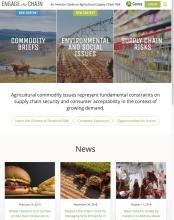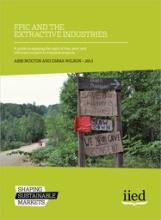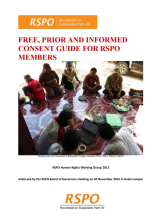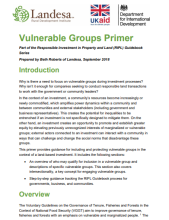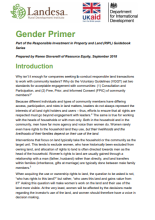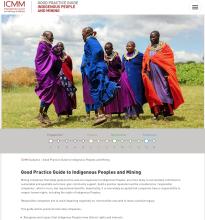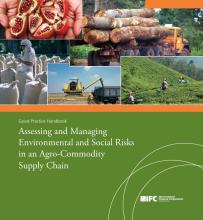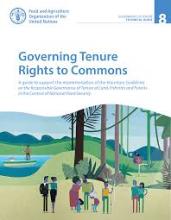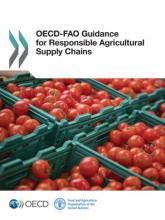Resources for Operators
Engage the Chain: An Investor Guide on Agricultural Supply Chain Risk
This interactive guide discusses the environmental and social risks and impacts associated with a number of agricultural commodities, which are among the most prominent drivers of deforestation, greenhouse gas emissions and water depletion and pollution.It clarifies actions investors and companies should take to reduce agricultural supply chain risks and exposure. It also contains additional resources, such as downloadeable guides.
FPIC and the Extractive Industries - A guide to applying the spirit of free, prior and informed consent in industrial projects
This guide offers a three-point framework for companies seeking to integrate FPIC principles into their policies and apply them in the operations. This includes
• complying with the requirements for FPIC under international and national law,
• implementing FPIC principles throughout the project life-cycle, and
• extending FPIC processes to all project-affected communities in line with good practice guidance. It also seeks to
• articulate the relevance of FPIC to company policy and practice, and
• provides insights into what it means to respect individual and collective rights, and for people to have a meaningful voice in deliberative decision-making processes about their own development.
Free, Prior and Informed Consent Guide for RSPO Members
This Guide provides advice for agribusiness companies on how to responsibly implement the FPIC principles in their operations. It is based on the revised RSPO standard (the Principles, Criteria and Indicators) pertinent to FPIC. The guide
• sets out the requirements of the RSPO Principles, Criteria and Indicators relevant to FPIC, and
• provides recommendations of best practice for how to achieve compliance with these requirements.
Free, Prior and Informed Consent Primer (Responsible Investment in Property and Land (RIPL) Guidebook Series)
This guide is directed at governments and companies seeking information on implementing FPIC principles in investment operations to safeguard the land rights of project-affected communities. It describes the key elements of FPIC, details steps that need to take place to ensure compliance with FPIC and lists additional resources that business enterprises can consult for further guidance on how to adhere to the principles of FPIC.
Gender Primer (Responsible Investment in Property and Land (RIPL) Guidebook Series)
This primer provides guidance for companies who seek to ensure that risks for project-affected communities are minimised, especially for women, who can be more vulnerable than men when it comes to land tenure. It provides step by step requirements to ensure that women as well as men are aware of and benefit from a proposed land transaction. For each step, the primer includes a checklist of questions to help guide the work and a list of resources where more detailed information can be found.
Good Practice Guide to Indigenous Peoples and Mining
This guide and its practical tools help companies:
• Recognise and respect that Indigenous Peoples have distinct rights and interests
• Understand that through law and/or custom, Indigenous People often have a special relationship to the land, territories and resources
• Utilise forms of engagements that are sensitive to cultural characteristics eg governance structures, interaction and decision making
• Understand that free, prior and informed consent (FPIC) should be regarded as a “principle to be respected to the greatest degree possible in development planning and implementation”
• Address issues requiring special attention to the interests and rights of indigenous groups
• Understand that historically, Indigenous Peoples have been disadvantaged, discriminated against and dispossessed of their land.
Good Practice Handbook: Assessing and Managing Environmental and Social Risks in an Agro-Commodity Supply Chain
This handbook is intended for agro-commodity companies that want to better manage supply chain environmental and social risks. The Handbook focuses on five major agro-commodity supply chains—palm oil, soy, sugarcane, cocoa, and coffee—but many of the tools, resources, and case studies can be used as guidance for other agro-commodities.
Governing Tenure Rights to Commons
This guide aims to support states, community-based organizations, civil society organizations, the private sector and other relevant actors, to take proactive measures to implement the standards and recommendations of the Voluntary Guidelines on the Responsible Governance of Tenure (VGGT). The goal is to achieve legal recognition and protection of tenure rights to commons and community-based governance structures.
Grievance mechanisms (Responsible Investment in Property and Land (RIPL) Guidebook Series)
This Primer provides practical guidance for companies on how to design, implement, manage, and monitor a company-based grievance mechanism. It is divided into the three main sections and associated steps:
• how to design and implement a company-based grievance mechanism,
• how to create procedures for receiving, investigating, and responding to complaints, and
• how to create procedures for monitoring and evaluating the grievance mechanism.
Guidance for Responsible Agricultural Supply Chains
This guide aims to help enterprises observe standards of responsible business conduct and undertake due diligence along agricultural supply chains in order to ensure that their operations contribute to sustainable development. It provides information on
• a model enterprise policy outlining the standards that enterprises should observe to build responsible agricultural supply chains,
• a framework for risk-based due diligence describing the five steps that enterprises should follow to identify, assess, mitigate and account for how they address the adverse impacts of their activities,
• description of the major risks faced by enterprises and the measures to mitigate these risks, and
• Guidance for engaging with indigenous peoples.


